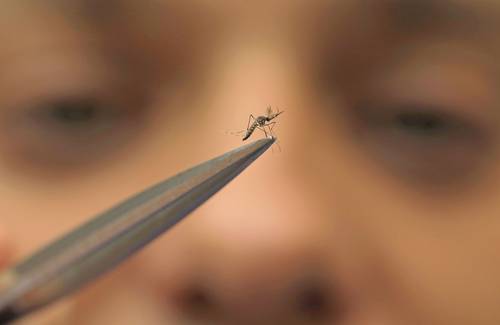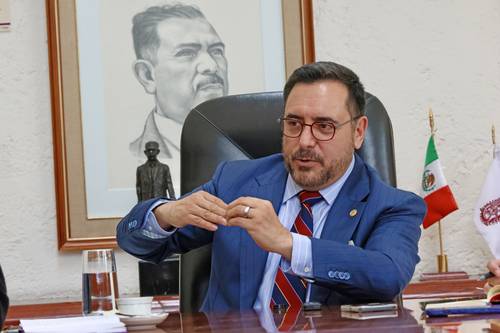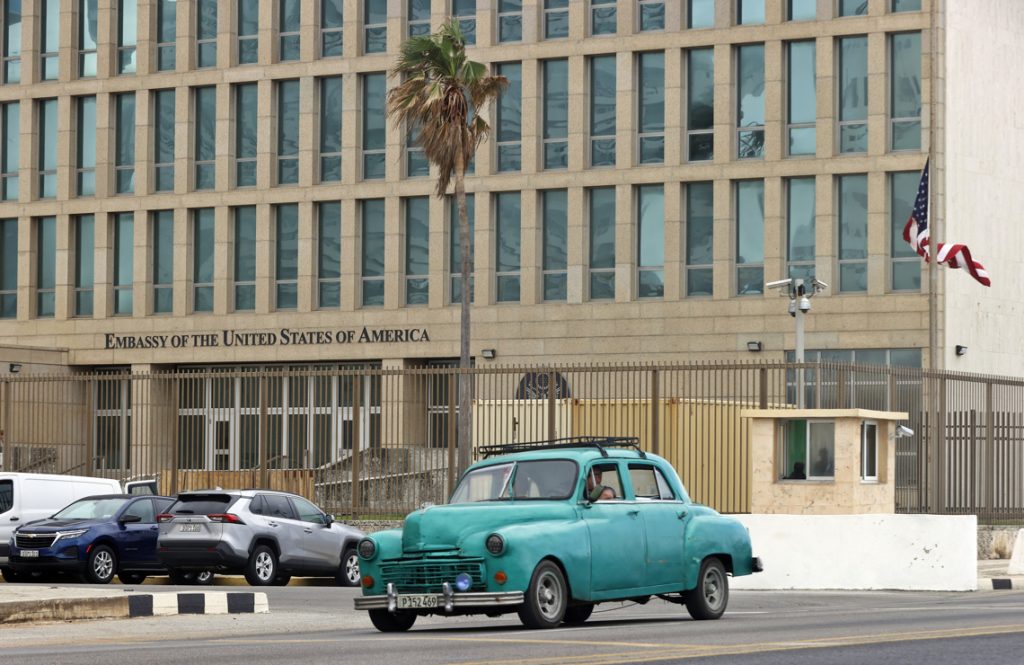▲ Arturo Reyes Sandoval, director of the IPN and expert in vaccine development.Photo Luis Castillo

▲ A laboratory worker holds a male specimen of a mosquito carrying the Wolbachia bacteria, which interrupts the transmission of dengue.Photo Ap
Laura Poy and Alexia Villaseñor
La Jornada Newspaper
Monday, January 20, 2025, p. 8
Dengue disease is already one of the most serious health problems in the world, warns Arturo Reyes Sandoval, general director of the National Polytechnic Institute (IPN) and expert in vaccine development.
In Mexico, he acknowledges, the growth of infections is exponential. And among the factors that would be influencing this phenomenon are climate change, population density, a better and greater provision of infection detection tests and the high rate of comorbidities that the population suffers such as diabetes, obesity and hypertension, which can generate a greater risk of contracting an infection.
In interview with The Daythe scientist assures that despite the complexity involved in developing a biological against this viral disease – produced by four different serotypes that generate high variability and transmitted by mosquitoes Aedes– It will not take more than two years for a vaccine to finally be authorized and available for use.
thanks to the most recent advances in science.
Sandoval Reyes, professor at the University of Oxford and researcher, before assuming the direction of the IPN, at the Jenner Institute, where one of the vaccines against covid-19 was developed, affirms that Mexico promotes scientific projects for the development of biologicals.
Qualifies as a jewel
of the Polytechnic the creation and operation, from 2022, of the National Laboratory of Vaccinology and Tropical Viruses (LNVyVT), one of the two Mexican public scientific institutions certified by the Atlanta Center for Disease Control, and with the capacity to carry out frontier research in tropical viruses and vaccines, as well as preclinical trials of bioluminescence and other biopharmaceuticals.
In addition, it announces that this year the first generation of experts will graduate from the IPN Postgraduate Science and Technology of Vaccines and Biotherapeutics, the only program in the world in this subject, which allows specialization from the generation of new vaccines to the registration of patents. .
–What has been missing to achieve a vaccine against dengue?
–Diseases that affect low- or middle-income countries keep vaccine development neglected. More budget funds are needed, because when diseases affect advanced economies or developed countries and there is investment capacity, vaccines are released.
Mexico is working on it. There are institutions where vaccines are developed and the IPN is one (…) We have created what I consider a jewel for Mexico, a laboratory with biosafety level 3, with which highly pathogenic viruses such as covid-19, monkeypox, zika, chikungunya and, of course, dengue.
The high incidence rate of dengue in recent years, recognizes the level II specialist of the National System of Researchers (SNII), had not been seen before
. Until the first two decades of this century, he explains, infections had remained stable at an annual average of 50 thousand cases, but starting in 2023 a substantial increase is reported. Those 50 thousand cases are now reached in the first three or four months of the year. Something happens. In 2024 we go from 50 thousand to 125 thousand 160 confirmed infections. The concern is real. What happened from 2022 to 2024?
It emphasizes that on a global scale each year 100 million people are infected with this virus, and almost half of the world’s population is at risk, that is, more than 2.5 billion inhabitants.
He points out that last year, cases occurred in almost all countries, infections are no longer generated exclusively in tropical and subtropical regions, and climate change also had an impact on this.
One of the problems of contracting this virus is that it can go from a non-serious illness to a very serious one, leading the patient to death. In Mexico viral infections Those who are most affected are older adults, children and the poorest people.
he points out.
–What role can Mexico play in the development of this vaccine?
–Mexico has all the capabilities, both in infrastructure and trained people, to develop a vaccine against dengue. There are countries that are already developing it and are very advanced, such as Brazil and Japan.
The pandemic gave us a very clear example that, when you want, you can. And in less than a year. The design of the vaccine against covid-19, I was at Oxford, was created in a month. The design can be done in a weekend, because everything is on the computer. In a week the process of inserting a gene into an adenovirus is carried out, and in a month the prototype vaccine is available; in three weeks, if you feel like it.
–What investment did the IPN allocate for the creation of the National Vaccinology Laboratory?
–It was an amount of 70 million pesos, which is not that much. The difficult thing is to maintain its operation, with an average cost of 5 million pesos annually. Due to the type of scientific infrastructure available, they are quite expensive facilities, but it is important to maintain them between pandemics, because it is certain that there will be more epidemics.
During this period of 5 or 7 years, these teams and work groups must be maintained to generate other developments. This is the case of covid-19, for example, but other vaccines such as chikungunya and influenza (which changes every year) must also be developed, and have the infrastructure in place to use it if it is required for a new pandemic.
–Are new vaccine developments being sought?
–We are working with adenoviruses –used in gene therapy–, which are like platforms, a vehicle to which we can genetically put a passenger
. The adenovirus was the platform used to develop the vaccine against covid-19. It is of chimpanzee origin and was created in 2002. Research that was part of my graduate thesis in the United States.
“It’s a moldable system that you can change the ‘passenger’ and develop vaccines for diseases like malaria, human papillomavirus, HIV and influenza.
In our case, we have a beautiful project, which is to isolate new adenoviruses, if not from chimpanzees, then from new and old world monkeys. We have more than 200 samples obtained from 20 zoos. To date, we have purified four adenoviruses that we are going to genetically isolate
.
–Will Mexico have its own adenoviruses; Will you experiment with them?
-Yeah. These are going to be key to creating vaccines in a new epidemic, although they are not a universal response against all pathogens.
We already have several research projects. We are working with clinical trials. I did a trial a few years ago for Zika and chikungunya and we are working on it at the Polytechnic, in collaboration with the universities of Surrey and Oxford
in England.
Reyes Sandoval recalls that the vaccine production process is so complex that It requires not only the participation of a research center, institute or university, but also multiple entities and regulatory commissions, such as the Federal Commission for the Protection against Health Risks. And the industry is also required to carry out these projects.
given the high cost of conducting clinical trials with populations from different parts of the world.

















